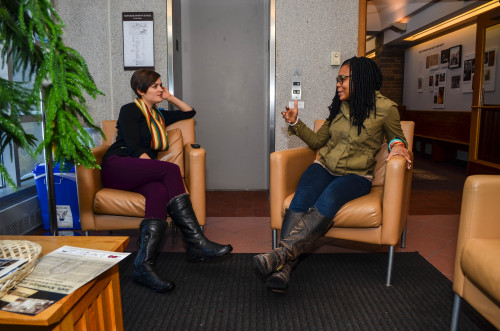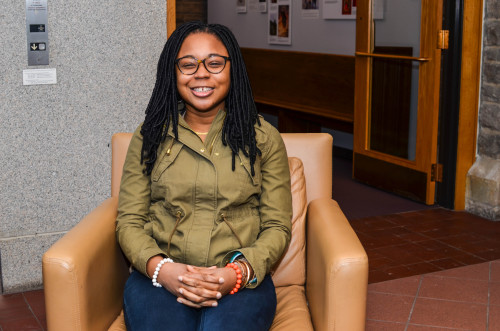
Christina Désert, MDiv
’19
Christina is a
second-year master of divinity candidate, a social worker, and activist from
Haiti.
“I come from a family of mighty women who are great
activists.”
My Last Years in Haiti
I was born in Port-au-Prince. Growing up in Haiti was
very different than living in the United States, where we moved when I was 14.
I remember my last few years in Haiti as conflict-filled. Crowd suppression gas
and pipe bombs became part of my life. The Haitian people were fighting each
other, and we children encountered conflict on the way to school and while in
school. Some of my friends were kidnapped. My aunt was beaten. On the way to
school people pointed a gun at us. The poor revolted against those with more
privilege. It was a social class struggle, but I believe it was mostly fed by
the government.
Many young men and women are unable to afford an
education in Haiti. In the public school system, there are many teachers who
don’t come teach because they aren’t getting paid. Still, even if the poor were
to have an education, it’s difficult to find a job. The unemployment rate
remains extremely high.
During the time I was growing up, there was a lot of drug
abuse within and outside of the government. Exploited by their government, the
poor felt like their only recourse was to revolt against the middle and upper
class—people who hold much of the wealth in Haiti and do not care about how the
poor live. They are not willing to give up any of their powers or their
privilege. I think what I saw growing up was the poor trying to demand that
those with privileges value their humanity and respect their dignity.
Caring for the
Poor
My dad, as a pediatrician, worked with Nos Petits Freres et Soeurs (Our Little
Brothers and Sisters), a hospital that cares for those whom our society has forgotten.
Most of its patients had HIV/AIDS and/or suffered from tuberculosis. My dad is
also a deacon in the Catholic Church. He had grown up poor, and as a young man,
had made a vow of simplicity or poverty. He would go to the streets and pick up
bodies of people who were dying or had died—especially those without a home—and
care for them. That was primarily his work as a doctor.
Still, we had a relatively privileged life in Haiti. One
Christmas, when I was maybe 10 years old, my siblings and I were not very
happy with the present we received. My dad was extremely mad. He said,
“Let’s go for a trip,” which I thought was a weird punishment. On
that day, he showed us the work he was doing, and every Sunday afterwards, he
took us to volunteer with the Sisters of Charity. We built relationships with
children whose parents could not care for them. Many of them had HIV/AIDS.
Legacy of Activism
In Haiti people say that the men are the ones who do the
politics while the women remain in the kitchen and perform traditional gender
roles. That is perhaps true, but my experience was very different. I come from
a family of mighty women who are great activists.
My mom and aunt would always go out and protest. The police force would be there, the chimères—most of them poor young men—would also be there, throwing pipe bombs and tear gas, and then there would be gun fights. Sometimes my mom would say to my aunt, “You go today,” and then my mom would go protest the next day so that if one of them were to die, the other would be left to take care of the children. Most of the time, they would go together.
My dad didn’t want to be engaged with the political
climate, out of fear of the government and police. But when protestors and
people on the government’s “wanted” list needed a place to hide, my mom and
aunt would hide them at home. Sometimes when people got shot at a protest, my
mom and aunt would bring them to our house so that my dad could take care of
them. Although my dad didn’t want to be engaged with politics, he had made an oath
as a doctor to save lives. Justice matters to my parents. My dad did his work.
Saving lives, he believed, was his way of doing justice. My parents are very proud
of their Haitian heritage. They wanted our country to become a better place so
that their children and other people would be able to live in a better Haiti.
I come from a family of very vocal women. Once after my
aunt was beaten, we couldn’t find her and didn’t know where she was. It turns
out she was in the hospital. After church, we suddenly heard her voice on the
radio. Apparently the prime minister was going to go “visit” the hospital, which
was not a good thing because he would try to finish the protestors off. People
would disappear and we wouldn’t know what happened. It was a scary time. But my
aunt was so vocal! As she was interviewed from the hospital, she said over the
radio, “If he [the prime minister] comes to my room, I will spit in his
face!” So my dad went to the hospital to disguise my aunt and bring her home.
She put a wig on and pretended to be an old lady.

From Medicine to Social Work
My first year of undergrad I was pre-med, and like many
college students I thought I would become like my father, working with the poor
as a medical practitioner. Although I did well in my classes, I soon realized
medicine was not for me. I graduated with majors in psychology and French.
During my undergraduate studies, I volunteered in the
inner cities in St. Paul, Minnesota. I also worked with racial justice
initiatives. For me, it made sense that, after I graduated, I would spend a
year of my life accompanying people who are pushed to the margins of their
community. As a member of the Benedictine Women Service Corps, I lived with the
Benedictine Sisters of Virginia. While living at the monastery for a year, I
worked on their transitional program for women and children who are homeless. I
also worked on a literacy program for immigrants, refugees, and people who didn’t
get their high school degree. During that time I realized I wanted to be a
social worker. I went back to school. Both of my internships during my master
of social work degree focused on grassroots community organizing.
I specialize in women’s issues. For my master’s thesis, I
interviewed Haitian women from both the middle class and from low-income homes.
My purpose was to understand what justice and peace mean to women of Haiti—those
with privileges and those who are poor. In some ways, these women’s ideas of
justice were similar, because they all talked about education and employment. But
they were also very different. The poor emphasized the need to respect a
person’s dignity—since their dignity has been violated throughout their lives—whereas
I don’t think the middle class even thought about it.
My Activism
For many of the women whom I talked to, justice and peace
is rooted within their faith and spirituality. But in my opinion, the Christian
Church, including the Catholic church, remains apolitical. That’s the reason
I’m here. As a Catholic woman, I want to work as a bridge-builder between the
Church and Haitian women, especially those who are poor. At the same time, I
struggle with my own faith and spirituality. I understand that the Catholic
church is not necessarily very welcoming of women’s voices. Yet, I want to see
how the Church can be involved in justice work while partnering with women. That’s
why I came to divinity school. I understand the social work, but I really
wanted the language to understand the priests’ side of the work.
Inspiration
Lately I’ve been listening to a lot of music, and one song I go back to often is Andra Day’s “Rise Up.”
For me, it’s about this idea of Black hope and Black resistance. I think about my own ancestors. In Haiti, and also in the U.S., what does it mean to be kidnapped and forced from Africa to slavery in the Americas and still have hope and resist? What does it mean when one’s very survival is an act of resistance against systems that oppress their Black bodies? As the Haitian proverb says, “Pito nou led, nou la”—which translates to, “We might be ugly, but we are here.” We are here in the collective, caring for one another. I am right here, sister, brother—join me in this journey!
Photos: Laura Krueger
